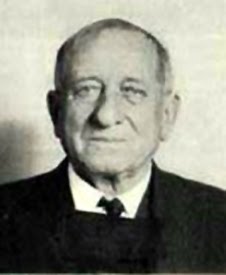
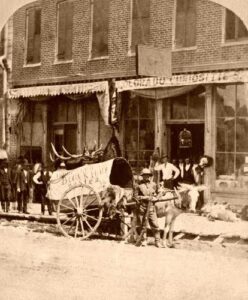 Louis H Blonger was born in Swanton, Vermont, on May 13, 1849. He was the eighth of 13 children. His father, Simon Peter Belonger, was a stonemason born in Canada of French ancestry. His mother, Judith Kennedy, was raised in an orphanage in Nenagh, County Tipperary, Ireland. The Belonger family migrated from Vermont to the lead mining village of Shullsburg, Wisconsin, when Lou was five years old. Sadly, his mother died in 1859, and Lou was sent to live with his older sister and her husband for a few years. It was around that time, that Blonger began using a shortened version of the family name (omitting the first “e”), as most of his brothers did.
Louis H Blonger was born in Swanton, Vermont, on May 13, 1849. He was the eighth of 13 children. His father, Simon Peter Belonger, was a stonemason born in Canada of French ancestry. His mother, Judith Kennedy, was raised in an orphanage in Nenagh, County Tipperary, Ireland. The Belonger family migrated from Vermont to the lead mining village of Shullsburg, Wisconsin, when Lou was five years old. Sadly, his mother died in 1859, and Lou was sent to live with his older sister and her husband for a few years. It was around that time, that Blonger began using a shortened version of the family name (omitting the first “e”), as most of his brothers did.
The Civil War broke out when Lou was just 15 years old. While he was technically just a boy, Lou enlisted in the Union Army anyway. While he was a soldier, someone must have known that he was quite young, and he soon found himself playing a musical instrument called a fife, helping to keep the marching pace of the soldiers. A Fifer was a common job for those boys who were too young to fight. When the war ended, Lou joined up with his older brother, Sam. The boys headed west hoping to make their fortunes in the many Colorado, Utah, and Nevada mining camps. As they were about to find out, mining isn’t the easiest way to make “your fortune” and so they found themselves moving from camp to camp, taking various jobs working in saloons and mines while doing a little prospecting, plenty of gambling, and practicing several con games in cities across the West, from Deadwood, South Dakota, to Silver City, New Mexico, and on to San Francisco, California. For a short time, Lou and Sam even served as lawmen in Albuquerque, New Mexico, where they were said to have provided protection for Doc Holliday and Wyatt Earp.
The brothers could be found in Denver, Colorado by the 1880s, where they ran a saloon on Larimer Street and later on Stout Street. Within ten years, they had become wealthy from their investments in mining claims, as well as their profits from their popular Denver saloons. Their saloons catered to gamblers and provided “painted ladies” for their customers, but it was far more due to their various games of fraud and graft practiced on many 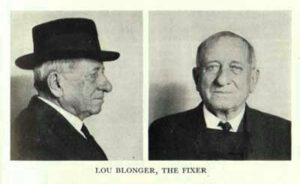 a hapless miner, that brought in the most money for the pair. While in Denver, they practiced their cons widely, in open competition with the well-known Soapy Smith Gang. Eventually, the Blonger brothers took over control as the “Kingpins” of the Denver underworld, when Soapy Smith moved on in 1896. They consolidated the city’s competing gangs of confidence men into a single organization.
a hapless miner, that brought in the most money for the pair. While in Denver, they practiced their cons widely, in open competition with the well-known Soapy Smith Gang. Eventually, the Blonger brothers took over control as the “Kingpins” of the Denver underworld, when Soapy Smith moved on in 1896. They consolidated the city’s competing gangs of confidence men into a single organization.
Operating their “business” as a “big store” con, or fake betting house, central facilities were established, complete with betting windows, chalkboards for race results, and ticker-tape machines. Here, the gang members would convince unsuspecting customers to put up large sums of cash to secure the delivery of promised stock profits or winning bets on horse races. It was this practice that is portrayed in the movie, The Sting. Lou also had several men working for him who profited as pickpockets, shell-game experts, and other small-time con games. Lou’s operation was so tight that no one could operate in the city without gaining his permission and “donating” a share of their proceeds to him. Not satisfied with their original influence, they began to wield their power by influencing elections and political appointments to protect their racket and shield their gang members from prosecution.
Blonger added a second-in-command, named Adolph W “Kid” Duff in 1904. Duff was an experienced hand, having long been a member of several other Colorado gangs and well known as a gambler, opium dealer, and pickpocket. With this addition, the profits of the “organization” increased, and by 1920, Lou Blonger had grown so powerful that many said he “owned” the city of Denver. He was said to be able to fix any arrest with a phone call and was making thousands of illegal dollars a year in his extensive confidence games. Lou even had a private telephone line in his office that ran directly to the chief of police…who was also corrupt. Lou had become known as “The Fixer” and had become one of the leaders of the longest-running confidence rings in the American West. Nevertheless, even this was a doomed enterprise.
Blonger had been a decent young man turned successful criminal for decades, when in 1922, it all ended. Di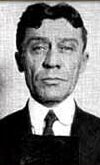
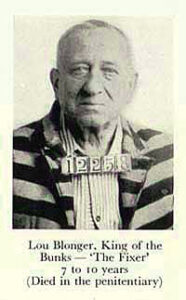 strict Attorney Philip S Van Cise circumvented the corrupt Denver politicians and established his own “secret force” of local citizens. They were funded by private donations, an Van Cise’s men were able to arrest 33 confidence men, including Louis Blonger and “Kid” Duff. The trial was big news and highly publicized. The people were tired of the corruption, and upon their conviction, Louis Blonger and many other gang members were sentenced to prison in Cañon City, Colorado. Lou Blonger and “Kid”, Duff received sentences of seven to ten years, nevertheless, Blonger would again escape hi “due punishment” when just five months after going to prison, he died on April 20, 1924, at the age of 74. Duff, in the meantime, was out on bond pending another court case, when he committed suicide. You might be wondering what Lou’s older brother Sam was doing at this time. Sam had died some ten years earlier.
strict Attorney Philip S Van Cise circumvented the corrupt Denver politicians and established his own “secret force” of local citizens. They were funded by private donations, an Van Cise’s men were able to arrest 33 confidence men, including Louis Blonger and “Kid” Duff. The trial was big news and highly publicized. The people were tired of the corruption, and upon their conviction, Louis Blonger and many other gang members were sentenced to prison in Cañon City, Colorado. Lou Blonger and “Kid”, Duff received sentences of seven to ten years, nevertheless, Blonger would again escape hi “due punishment” when just five months after going to prison, he died on April 20, 1924, at the age of 74. Duff, in the meantime, was out on bond pending another court case, when he committed suicide. You might be wondering what Lou’s older brother Sam was doing at this time. Sam had died some ten years earlier.


One Response to The Fixer